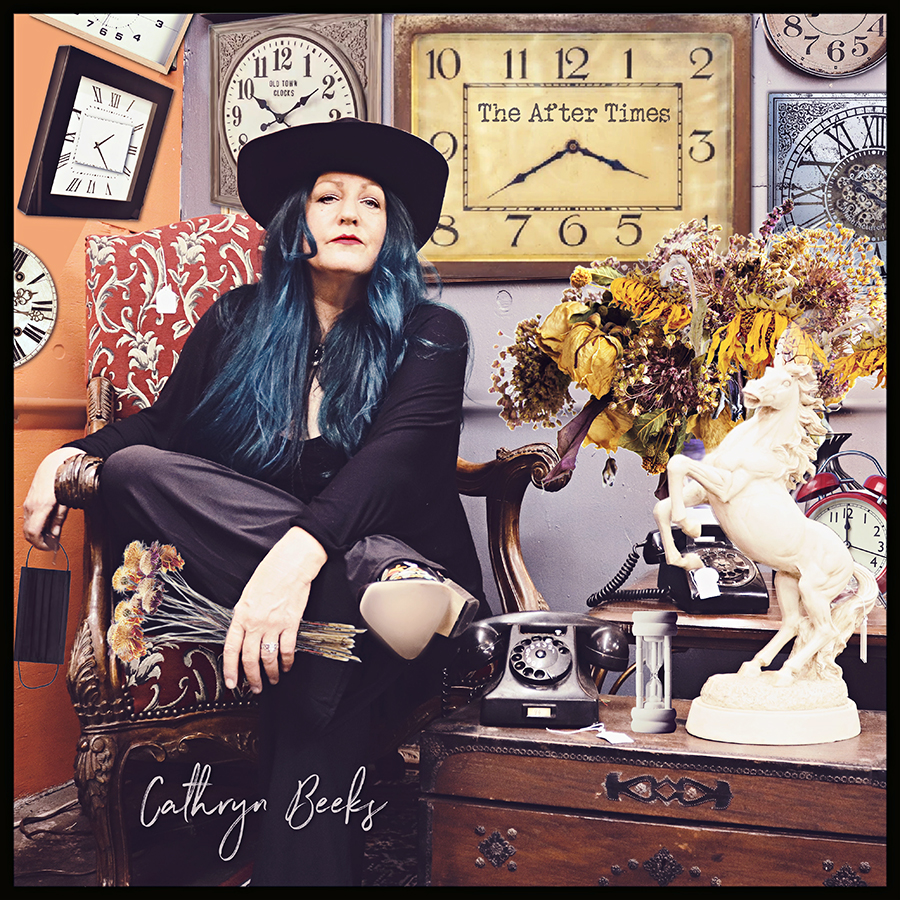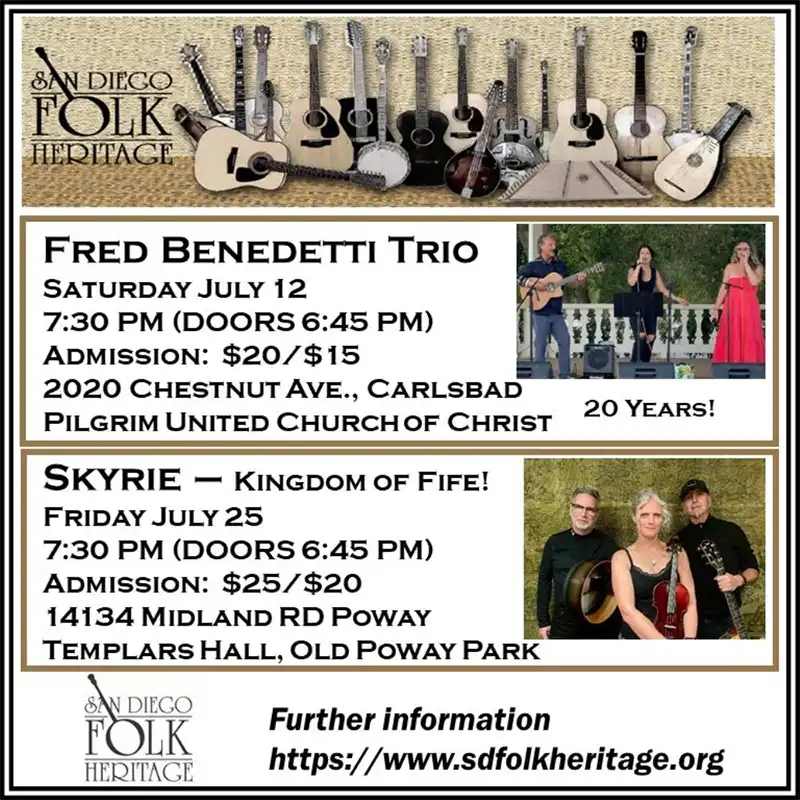CD Reviews
CATHRYN BEEKS: The After Times

For this, her first solo album since 2019, Cathryn Beeks released The After Times exclusively on Patreon, in a nudge to encourage new subscribers to her channel. Even non-subscribers will eventually get to hear all 11 songs on the 47-minute-long album, as Beeks will release a new music video to the public every four to eight weeks.
The After Times was recorded, engineered, mixed, and produced at Satellite Studio by Jeff Berkley, who also played guitars and banjos. Beeks played ukulele and sang lead and backing vocals. With little to no vibrato, her voice is strong, yet smooth. It melts and flows through each track like caramel, a persistent fullness in my ears. She is artful when singing her harmonies; they are joyous and a perfect mix of adventure and surefootedness. The recording is perfectly balanced, with pristine clarity in her voice and lyrics. At no point do I have to try to hear what she has to say; her words are right there in front of me, and I understand completely.
Joined by her fellow bandmates from Jeff Berkley and the Banned, they are Josh Hermsmeier on drums, Rick Nash on bass, Josh Weinstein on keys, and Ted Stern on pedal steel. Joshua Taylor and Sandi King of King Taylor Project provided additional backing vocals, and Zen Mastering’s Paul Abbott mastered the project.
A banjo-dominant intro leads us into the opener “I Love Ramona,” in which Beeks expresses just that and does a dandy job of personifying the qualities of her new home town. She nails it with the adjectives; the lyrics are comfortable and sometimes provocative.
She’s tough as nails, she ain’t too girly.
Rides and ropes and gets up early.
Grows grapes and raises hens,
she ain’t afraid of anything.
She’s lush and green, and she is curvy.
You get to know her, if you’re worthy.
So glad she let me in,
I know we’re gonna be great friends.
Throughout the arrangement, banjo repeats the opening tag accented by piano. In a move I’d call the ultimate in blood harmony, Beeks supports her own lead vocal with sweet, soothing backing vocals. Starting off quietly with three-part oohs and lead vocal lines in the verses and growing to the big “Ramona” behind the bridge, every choice she makes is perfect. The verse after the bridge is like the sun coming up. Piano does a little flick of the fingers and then a walk down that stokes the growing energy; all other instrumentation is sparse and mimics the break of dawn. “I love the way she starts the day, when the roosters wake and have their say…” The final chorus comes in even stronger and more declarative, stating fully and clearly her tribute, “I love Ramona in every way.” This song appears on the compilation album called Our Ramona released by the Ramona Music Alliance in 2023, and it also received a well-deserved 2024 San Diego Music Award nomination for best folk or acoustic song.
The intro to “You Wreck It” swings good and hard from the very first note and makes me want to get up off my seat and move, or march, or stand proudly atop a soap box. The drums and bass accentuate the three-quarter time, with piano hits in between. Then at the verse, everyone drops out and gets quiet, while the drums play half time. Beeks has got the run of rotten down with a long list of the types of people who take from all of us. Then we’re at the chorus, which, like the intro, is driving and rousing and an invitation to join in. I am inspired to raise my glass and sway with friends and sing at the top of my lungs. At :54 there’s a short instrumental break, loosely led by pedal steel and those lively drums. Second verse comes in clear like the first and we hear the lyrics.
Religious fanatics,
enablers of addicts,
cheaters on spouses,
robbers of houses.
Bigots and racists,
friends with two faces.
Misogynistic bosses,
those who burn crosses.
At 2:08, Beeks calls out a whoop and the rhythm guitar answers with a few intentionally dissonant chords at the start of a boisterous solo that continues to raise the roof in this rabble-rousing barn dance of a song. After another verse and the final chorus, the instruments take us out to more hoots and hollers and hey hey heys. I love the whole energy of this track, especially how it calls out the troublemakers and appeals to our better selves to prevail. It’s my favorite, and I would call it a one-in-a-million song.
Beeks is a deep pool of personal and social concern, mixed with the angst of possibly falling short for herself or those around her. “Empathy” is another three-quarter-time song with energy and drive. It opens with lead guitar, melodic and course, with a tag that is repeated elsewhere in the song. Once the verse hits, the arrangement surrenders completely to the lyrics, right up front with a little reverb. After a short verse, the chorus reaches out suddenly and takes me by the lapels and makes me sit up and listen. Lower lead lines on the guitar flow around and in-between the singing, and backing vocals are luscious and full as they increase the intensity. I know that Beeks means every word, and I can surely relate to the second line.
Empathy is killing me slowly.
But I’d rather die than become numb.
It’s on my mind all the time, show me
how to hold sacred space
when peace won’t come.
The second verse is backed by those same low electric guitar notes. It continues to raise the tension level as Beeks adeptly breaks out vocally to sing, “Senseless ceaseless suffering, it wrecks me, I ain’t gonna lie.” Another chorus is followed by the bridge at 1:42, when the backing vocals become a choir and grow even bigger. At 2:00, the organ begins to play long full notes as the guitar takes a solo that makes my eyes squint and raises the hair on the back of my neck. It’s purposeful and raw, clean and edgy, they push and pull at the same time, like breathing. Backing vocals begin adding hits of ah ah ahs here and there until the whole thing is a flowering force of beautiful noise. I hear Sandi King wail effortlessly over the top as it all breaks for the final chorus.
“Terrible Wind” feels old world and, like fall or winter, when the light fades early. Banjo and keys (accordion), play an extended intro that sets up the lonely, dramatic stage. The bass steps in more playful and prominent as the verse goes along, which is followed by another intro-like section and a second verse. The bridge is a definite departure in melody and instrumentation, although remains congruent and is repeated again later in the song. Some might say that makes it a chorus, but it just doesn’t feel like it to me. Even though the song itself, played in minor chords, has a dark and shadowed edge to it, at 1:22, the keys solo bright and spirited, and lift the mood like a veil. It makes me feel hopeful and sit back and smile. The last verse brings in low single notes on the guitar, accenting and loosely mimicking the vocal lines. Their deepness is a comfort as the character remains rooted to her circumstances. The bridge is repeated and at the end of it, at 2:17, all hell breaks loose. The backing vocals stretch out bigger and bigger, so many layers, like souls rising up into a dark night, or tattered black banners thrashing in the wind. Sandi King is tremendous and strikingly even bigger than all that cacophony, truly epic. The song is soothed at 2:50, as Beeks repeats the first two lines of the song to end. “Lately I find everything is sublime, alone in my house.”
From the beginning, “This Time” sounds the most different of all songs on the album. Banjo takes center stage and is played in a nontraditional style, sounding very much like a sitar throughout. Finger picking and light strumming on acoustic guitar fill in the spaces behind banjo. Lead vocals are in the forefront and haunting with a slight echo. Beeks subtly and deliberately restrains her voice in the first verse. In the second verse, it becomes more desperate, as she injects a raspy edginess into her pleading.
And all I can hope for
is that their children
will see the light.
Look with your heart, kid,
you know what
they’re doing ain’t right.
I experience some confusion with this song. It seems to be a call to action, but I’m not sure what I’m to do. In the chorus, she wants to give up but admits that rage is what keeps her living. Hearing that makes it sound like what we’re fighting against may not be so different than who we are ourselves. If that’s the case, does that make the fight universal? And, if so, is that the middle ground?
This time we are living in
makes me wanna give in and die.
But this rage keeps me living,
injustice makes me wanna try.
I don’t understand how some
folks can turn a blind eye.
No more will I ignore,
I ain’t letting up this time.
Multi-voice backing vocals fill up the chorus, while the banjo continues playing more intricately. At 1:36, there’s a short instrumental between the chorus and third verse, with an emphasis on an understated yet poignant pedal steel. It continues to grow in intensity behind the last verse, as the banjo becomes more complex. Strong and ringing backing vocals join in at the middle of the verse, even though the character isn’t expecting it, the song calls for it. Another big chorus follows, then calms down to a bridge of mantra-like singing, with lush harmonies and feeling, and, for the first time, possible solutions. A final chorus includes a more aggresive collection of instruments behind it. Drums and lead guitar build until suddenly dropping out at the end, “Let’s face it, we’re not gonna change some people’s minds.”
There are six more highly worthy songs to hear. In the cautiously optimistic “Everyone Is,” she talks of good and beauty, and a simple belief that everyone is trying. “Sparrow Hawk Moon” is about the death of her father, her time of grief and growth, and letting go, and accepting his presence in everything around her. “Good Girl” is a love song to her dog Penny, a longtime companion who passed away, and who now waits for her on the moon with her dad. “Mysterious Bug” is her nod to Covid and the ways it has changed her outlook toward others and making physical connections. Her cover of “Ode to Billy Joe” is a double-time raucous blast. Her buttery voice is backed by funky organ, and it includes an inspired synthesizer solo. In “Shake It Off,” she gives herself a good talking to, even if it might not really help.
To listen to The After Times in its entirety, you’ll need to subscribe to Cathryn Beeks’ Patreon channel. Your monthly $5 supports her Listen Local Show podcast that features local music, as well as all her Listen Local endeavors. Go ahead and subscribe now because you’re going to want to hear this album now. https://www.patreon.com/ListenLocalRadio






